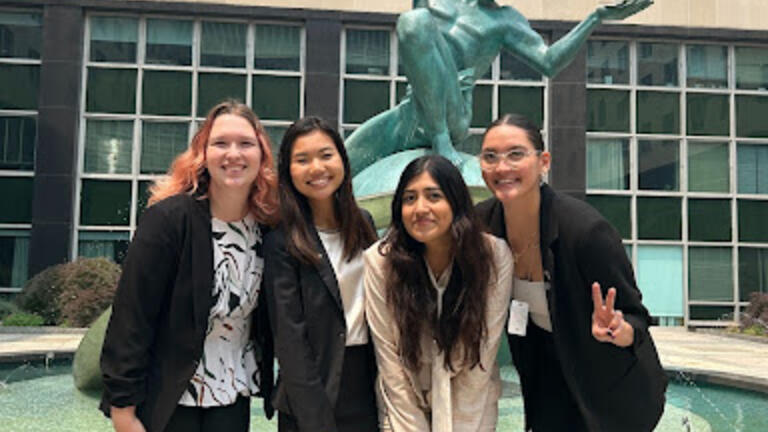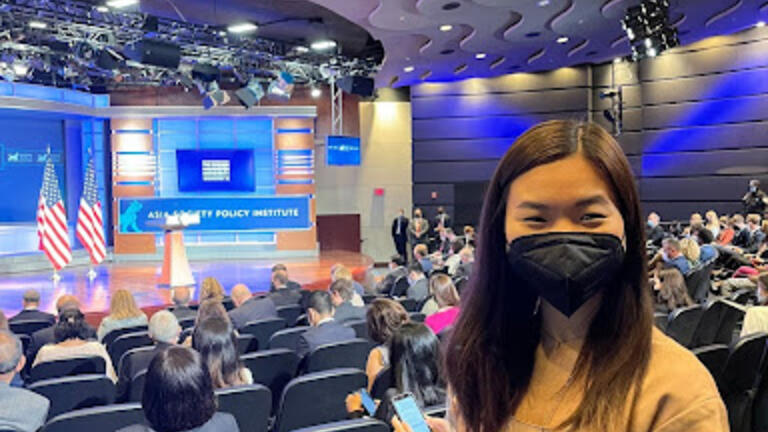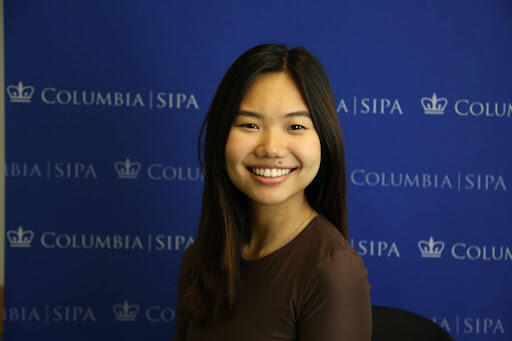
Diplomatic Fellowship Spotlight: Michelle Lee (Thomas R. Pickering Fellowship)
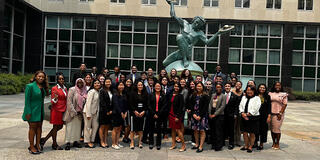
This blog is going to highlight a current Pickering Fellow and first-year SIPA student. If you are not familiar already with the Diplomatic Fellowship Fellowships, I strongly recommend you keep reading to learn more about how you can become an American diplomat AND get your graduate studies paid for.

Can you introduce yourself?
I am Michelle Lee a 2023 Thomas R. Pickering Fellow from Dallas, Texas, pursuing an MPA concentrating in International Security Policy. Before SIPA I completed my degree in International Relations and Economics at Wellesley College. I have participated in the London program of the School for Ethics and Global Leadership and the Overseas Korean Foundation. My past work experience includes interning for Artis Ventures and Lumen, an NGO that promotes information freedom for all, as well as government organizations such as USAID/RDMA Thailand, the United States House of Representatives, and the United States Department of State.
What led you to joining the Foreign Service? Why did you choose to pursue a career in international public service?
When my grandfather told me stories of having to leave behind his parents and siblings in North Korea during the Korean War, I initially felt resentment toward the foreign policies that divided my family. I witnessed how influential foreign policy can be, which led me to study international relations and economics in college.
In high school, I was vocal about telling my nonreligious classmates what the Bible teaches. "Christian girl" was my nickname. It was easy to stay true to myself because most of my peers shared my values. However, at Wellesley, I discovered that my Texan and Korean Baptist views were in the minority, and began to rethink both my political and religious views. Being surrounded by such racially and ideologically diverse students helped me see how my racial and spiritual identity has impacted others and allowed me to relate across cultures and viewpoints. I joined NGO Lumen because I felt the U.S.'s preservation of liberties is unique and should not be taken for granted. There, I wrote grants addressed to policymakers to fund programs that engineer stealth devices and absorbed powerful testimonies using my Korean verbal and written communication skills. As a diplomat, I want to learn more languages to bridge gaps between the US and its neighbors.
I recognize there are other paths to becoming a diplomat, like taking the FSOT, but I want to work with peers who care about diversity and inspire more women of color to join the foreign service. While working in the Press office, I filled in for my supervisor and memorized a succinct press summary to brief Ned Price, the DOS Spokesperson, on North Korean missile launches. I'm grateful for the hands-on experience, but I felt discouraged stepping into the EAP front office and seeing a wall of exclusively white men and similarly while scrolling through EAP’s Twitter feed just to see more male ambassadors. Representation is powerful and I cannot wait to see an Asian-American diplomat on the walls of the EAP office. Similarly, I was excited to intern for Michelle Steel, one of the first Korean-American Congresswomen, but was frustrated by constituents' racial remarks, which devalue Steel's work. While answering constituent calls, I had to maintain composure in order to synthesize concerns and maintain my integrity by objectively relaying messages to the broader team. These racist and frustrating interactions have shown me the necessity for dialogues about women's voices and the need for inclusive, tolerant spaces.
I've always wanted to learn about new languages and cultures. When I was younger, I would hear my grandfather tell me stories about having to leave his parents and siblings in North Korea during the Korean War. I was initially resentful of the foreign policies that divided my family, so I wanted to learn more by taking classes like AP Government in high school, which solidified my interest in pursuing a related field. Because of my family's history with foreign policy, I decided to study international relations and economics at Wellesley College and later apply for Pickering.
Attending Wellesley, where two great secretaries of state went was such a boost of inspiration. I first heard about the Pickering Fellowship while talking with a couple of International Relations seniors during my first year. The seniors actually went on to become Rangel and Pickering Fellows themselves! When I was a freshman, I can still vividly recall being in amazement as I read their stories. They were pivotal throughout my years at Wellesley since they guided me through the fellowship application process and assisted me in looking for government internships. Aside from them, I had a great relationship with Career Ed. I felt so lost during my first year and under pressure about needing to have everything figured out, so I scheduled a meeting one day to go over potential future options. I cannot thank my mentors enough for all the cover letters, personal statements, and resume edits that helped me to land internships at USAID, the State Department, and Congress.
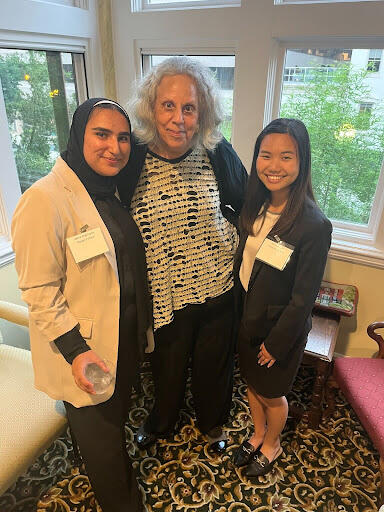
What was the application process like for the Foreign Service Fellowships?
To be honest, this was a grueling process. Applying for both the Rangel and Pickering Fellowships while keeping up with classes, organizations, friends, and other job applications was not the most fun. I started my personal statement over the summer and continued to refine it with mentors. Then it was the waiting game. After I was selected as a finalist, I had a limited amount of time to prepare for the writing assessment and interview. The fact that I had to write a timed essay on any foreign or domestic policy topic was daunting. Luckily, having to write often for class assessments provided an advantage. Next was tackling the interview. I appreciated going through mock interviews with Career Education and utilizing one of their private rooms for the actual thing. What a thrilling experience it was to have former ambassadors interview you! Phew. I ended the process by questioning whether I had proved enough. I didn’t think my essay or interview answers were as sharp as I wanted them to be, but by grace, I was ecstatic to find out my selection. The next step was a winter break grind of trying to study for the GRE in three days and apply to graduate programs that were due in a week.
Why did you choose SIPA?
I chose SIPA because I didn’t want to stay in a DC bubble, knowing I’d ultimately be back in DC to work in diplomacy after I graduate. I see myself pursuing a long career in foreign affairs, but I didn’t want to narrow myself to a network of politicians. SIPA was attractive because I could pursue an MPA which seemed more broad and allowed for future flexibility. Also, I was inspired to attend a program where most students come from international backgrounds, and being in New York was a huge pull. After speaking with SIPA alums and reading SIPA news stories about their experiences attending top level classes and then going to see a broadway show in the same day was the cherry on top. I’m happy there’s a strong Fellows community here as well. I don’t regret my decision. A highlight has been finding a new passion for security policy and taking classes with Dr. Biddle.
What have you enjoyed the most about being a Pickering Fellow?
Being a Pickering Fellow has been great! The best part? Definitely having a cohort of fellows. It's like having a built-in support system where we all learn and grow together. It’s nice meeting fellows outside of Pickering as well at SIPA. Getting into the world of diplomacy through this fellowship has allowed me to form relationships with mentors who are always there to answer any and all questions. Meeting recognized diplomats during orientation such as Ambassador Pickering himself has been a highlight. It's not every day that you get these opportunities. Plus, the Pickering Fellowship takes off the job application pressure during grad school since internships are set up. You can devote more time on your classes and make the most of the whole experience.
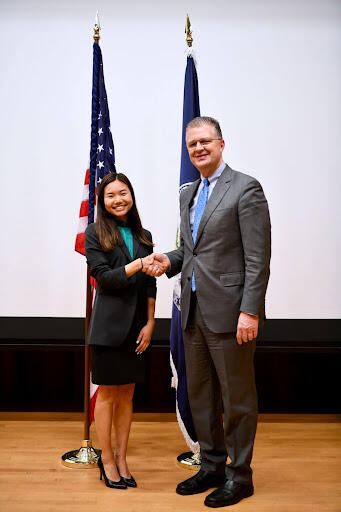
What advice do you have for prospective applicants interested in applying to both Pickering and SIPA?
Talking with current fellows at the time, I was inspired by the mission to increase diversity at State and also just because of how unique this opportunity is I decided to apply. It’s a wonderful chance to have financial support for graduate school and a couple of key leg-ups, such as a straight path into becoming a US diplomat! I’d say if you are at all interested in foreign affairs, then go for it! I know so many who have applied and ultimately got into the next cycle and were happy to have had some work experience before. Regardless of the outcome, you’re going to learn so much about how to handle stress and think on your feet. Having to answer questions about self motivation really made me think about my goals in life and personal story, all things that most interviews ask for. Please reach out! I’m happy to help you along the way. My biggest advice is to reach out to current fellows and ask about how they tackled the application process.
For SIPA: Similarly for Pickering, I recommend reaching out to current SIPA students or alums to make sure you can see yourself at SIPA and for help on the application process. Take some time considering MPA vs. MIA too.
General advice on balancing fellowship and grad apps: I knew that I wouldn’t go to grad school immediately if I didn’t get the fellowship. Because I found out about Pickering in late December, I rushed the grad application process. Luckily, I was able to reuse much of the fellowship material for grad apps, but I still wish I had more time to study for programs that required the GRE and I missed a couple of programs that had earlier deadlines. All in all, the process worked out, but I’d say if you want to attend grad school regardless, to start earlier than I did :)
What are you looking forward to the most this year?
I’m looking forward to taking less core classes in the Spring semester, such as North Korea State and Security and getting more involved in SIPA life in SIPASA (hopefully I can snag some merch this semester) and Korea Focus. Looking forward to events like Spring Gala and making the most of my summer internship at State.
For more information about the Thomas R. Pickering Foreign Affairs Graduate Fellowship, visit here!
